|
|
|
Sort Order |
|
|
|
Items / Page
|
|
|
|
|
|
|
| Srl | Item |
| 1 |
ID:
146264
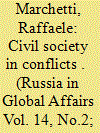

|
|
|
|
|
| Summary/Abstract |
Civil society actors have become key players in conflicts, especially in intra-state ones. This has been facilitated by the transformation of conflicts, increasingly characterized by high-intensity intra-border ethno-religious tensions and strong international influence by proxy. The usual take on conflicts focuses on the role of governmental actors, both national and international. Accordingly, violence and peace are usually considered to be determined above all by the political decisions of official institutions alone. While this remains partly true, in this paper I examine the other side of the coin: the non-governmental component in conflicts. Civil society actors, or as I define them, conflict society organizations, are increasingly central in view of the high degree of complexity of contemporary conflicts. These are conflicts that can only be understood by combining macro with micro approaches that focus on society. It is thanks to the latter approach that it is possible to unpack the political inputs, be they good or bad, which emerge from below, from the civil society domain, and scale up to the top political echelons. This is even more so in societies that are highly fragmented and deprived of stable governing institutions. It is in failing states such as those undergoing an ethno-political conflict that much of politics unfolds "on the ground." Hence it is there, at the micro level, that we need to explore
|
|
|
|
|
|
|
|
|
|
|
|
|
|
|
|
| 2 |
ID:
125903
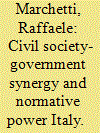

|
|
|
|
|
| Publication |
2013.
|
| Summary/Abstract |
There is a need for a reassessment of the Italian contribution to international affairs. If a more comprehensive and pluralist reading of Italian action at the international level is developed, an image of normative power Italy may emerge. Italian input has been crucial in a number of transnational campaigns that have had significant impact at the international level. The cases of the peace in Mozambique, the International Criminal Court, the Moratorium on the Death Penalty and, more recently, the Ban on Female Genital Mutilation all illustrate Italy's contribution to international affairs, especially the politics of norm change. These cases are all characterised by the presence of intense civil society-government synergy. In order to advance the understanding of the processes and impact of transnational mobilisations, this analysis examines the domestic conditions that facilitated such synergy, intended as key conditions for the empowerment of transnational activism itself.
|
|
|
|
|
|
|
|
|
|
|
|
|
|
|
|
| 3 |
ID:
088907
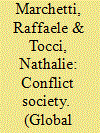

|
|
|
|
|
| Publication |
2009.
|
| Summary/Abstract |
This article analyses the relationship between civil society and conflict. It aims to provide an analytical framework to unpack this complex relationship and assess the impacts which civil society may have on conflict. In a first section, it analyses the implications of context on civil society, namely the implications that statehood, democracy, nationalism, development and international presence have on the nature of civil society. In the second section it examines more specifically the role of civil society in ethno-political conflicts, or as we rename it 'conflict society'. The final section turns to the identification of different factors determining the impact of civil society on conflicts, including political identities, frameworks of action and political opportunity structures in which civil society actors operate. Accordingly, the different combinations of these determinants lead to the formation of civil society actors and ensuing actions that can either fuel conflict, sustain the status quo, or build peace
|
|
|
|
|
|
|
|
|
|
|
|
|
|
|
|
| 4 |
ID:
125900
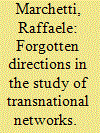

|
|
|
| 5 |
ID:
087344
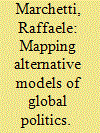

|
|
|
|
|
| Publication |
2009.
|
| Summary/Abstract |
This paper investigates the principal competing visions of global politics that are currently advanced in the public discourse about globalization in opposition to the traditional state-centered perspective. The first part of the paper develops an analysis of ideal models as cultural resources that grounds the different reading of human bonds. The second part applies the notion of ideal models to the new scenario of globalization, and identifies four alternative interpretations of the notion of global politics: namely Neo-liberalism, Cosmopolitanism, Alter-globalism, and Dialogue among Civilizations. The principal characteristics of these four notions are presented in order to map the current debate on the future of global politics.
|
|
|
|
|
|
|
|
|
|
|
|
|
|
|
|
| 6 |
ID:
086141
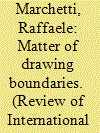

|
|
|
|
|
| Publication |
2008.
|
| Summary/Abstract |
This article defends the case for a global extension of democracy by deploying a cosmo-federalist theory. As a response to the current state of international exclusion, the radical project of stretching the paradigm of democratic inclusion to the extreme limits encompassing the whole of mankind, is here presented. The article begins by taking position for a choice-based version of consequentialism that generates a principle of political justice centred on political participation. From this, a political project is developed that envisages a cosmopolitan system where all world citizens are included within a scheme of a direct representative participation under an overarching authority governing the process of democratising world affairs. Crucial in this is the establishment of an all-inclusive authority to legitimately delineate jurisdictional boundaries and a multilayered system of political interaction.
|
|
|
|
|
|
|
|
|
|
|
|
|
|
|
|
|
|
|
|
|